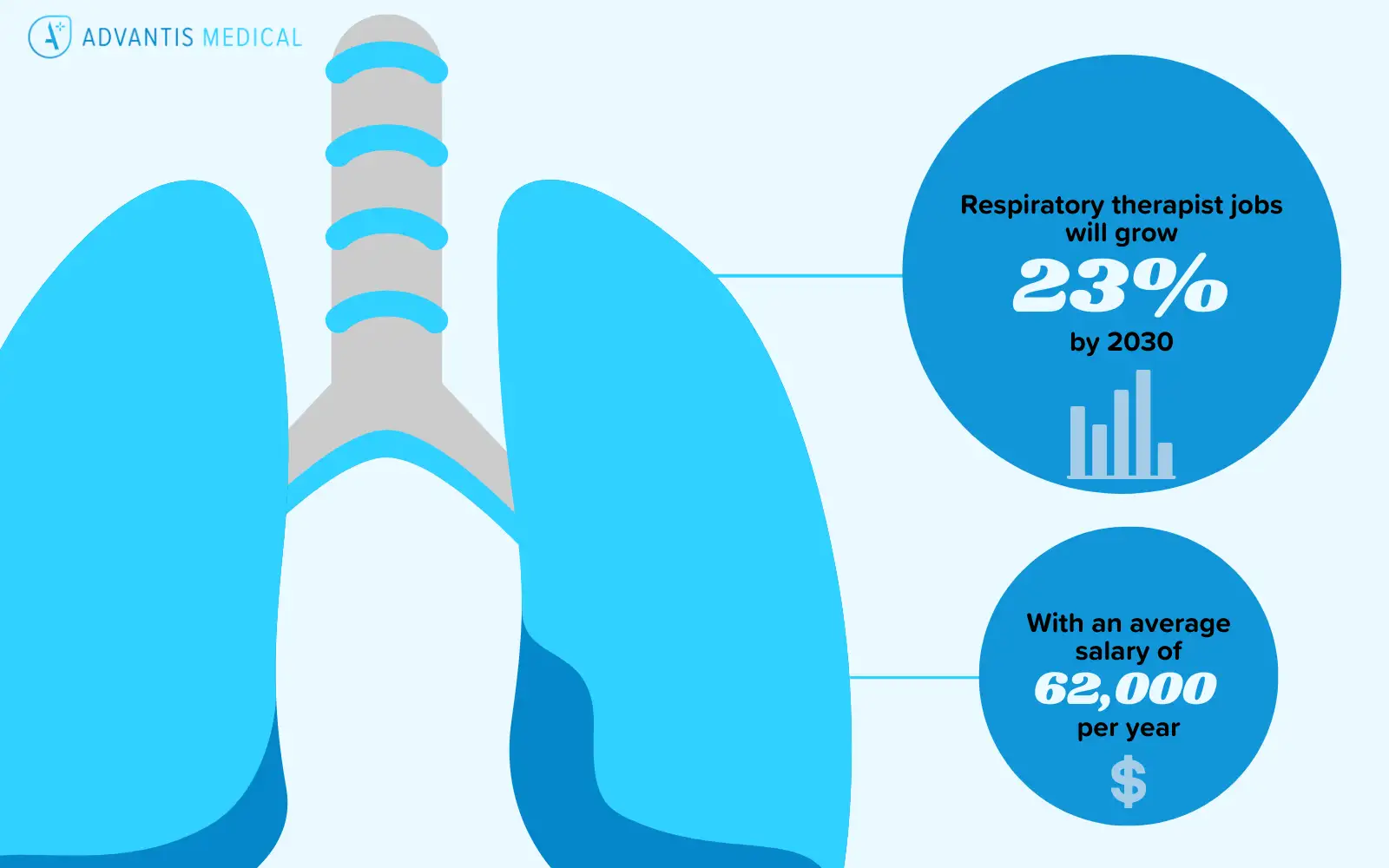Pursuing a career in respiratory therapy is both lucrative and rewarding. Dedicated and highly skilled respiratory therapists serve an essential function in healthcare facilities across the world. Their skills are in incredibly high demand, especially since the COVID-19 pandemic caused severe respiratory illness for millions of people.

The United States Bureau of Labor Statistics predicts that respiratory therapist job opportunities will grow 23% by 2030. With an average salary just shy of $62,000, it’s a reliable career path for many people—especially with the current shortage of these essential clinicians. And if you decide to pursue a travel respiratory therapist job, your prospects and salary are even better!
If you’re considering a career as a travel respiratory therapist, here’s how you can get licensed and edge out your competition to score the highest paying opportunities.
How to become a respiratory therapist
There’s extremely high demand for respiratory therapists all around the world. COVID-19 stretched many respiratory therapists thin, given its toll on respiratory function. The unlucky folks who experience severe COVID-19 and need ventilators benefit from respiratory therapists while they’re still in the hospital. And those who develop long covid sometimes need support from these healthcare professionals whether or not they become hospitalized.
As a result of these conditions and the present shortage of respiratory therapists, we expect exponential job growth for this career. Among careers in healthcare, this is one of the least grueling choices, but it’s still challenging.
To become a respiratory therapist, you need an associates degree from a program accredited by the Commission on Accreditation for Respiratory Care. There are also bachelor’s and master’s level programs in respiratory therapy.
After completing your program, you also need to pass two exams to earn your registered respiratory therapist credential. The therapist multiple-choice exam is first, followed by the clinical simulation examination. Passing these exams is the key for getting jobs in respiratory therapy.
Unlike some other clinical licenses, healthcare facilities accept this credential nationwide so you can get a job anywhere in the United States after you earn it.
Seek out challenging experiences
Healthcare professionals who travel for work are among the best in their field. They know the ins and outs of their profession and can easily adapt to a new team or healthcare environment. Respiratory therapists who travel are no different, so any challenging work experiences can help you prepare for traveling.
There are many respiratory therapy specializations to choose from, just like other careers in health. You can pursue a career focused on neonatal, pediatric, or geriatric patients. Other specialties include critical care and home care.
Some of the most challenging work for respiratory therapists is in pulmonary rehab and pulmonary diagnostics. Travel respiratory therapists who work in pulmonary rehab help patients with chronic respiratory illnesses improve their lung capacity, while those who work in pulmonary diagnostics perform tests and procedures in pulmonary function labs. You’ll need advanced credentials to pursue these specialties.
Keep your resume up to date
Once you’ve got some work experience and have settled into your career as a respiratory therapist it will be much easier to land a lucrative travel opportunity. Travel respiratory therapist jobs are in high demand, so have lots of competition. So keep your resume up to date to help you land the role you’ve been working toward.
Updating your resume is essential for making the leap from traditional respiratory therapy roles to traveling respiratory therapist jobs. Document your experiences on your resume to help prospective employers get an idea for your skill set and career trajectory. Each procedure, setting, and specialty you learn throughout your career will be helpful as you transition into a travel role.
Connect with a travel staffing recruiter
Healthcare professionals who travel are usually affiliated with a travel agency that contracts with healthcare facilities. Traveling respiratory therapists need to connect with a recruiter at the travel agency of their choice to learn about available opportunities.
The agency you choose depends on your goals and priorities. If you want to travel close to home, you should learn which agencies are operating at facilities around you. Other considerations are pay, benefits, and perks you want as a travel respiratory therapist. These are all great things to discuss with a healthcare recruiter.
Once you’ve chosen which agency to move forward with, you can search through their travel assignments to find something that works for you. Provide them with your updated resume and begin applying for exciting roles to catapult your career to the next level.
Advantis Medical has the best travel respiratory therapist jobs
When it comes to opportunities, benefits, and perks, Advantis Medical rivals other travel agencies. Healthcare workers who contract with us get competitive pay and benefits, housing assistance, and care team support. You also get paid via weekly direct deposit instead of waiting for biweekly or monthly pay periods.
Create an account on our AdvantisConnect job portal to get connected with your personal recruiter and browse thousands of travel respiratory therapist jobs.









